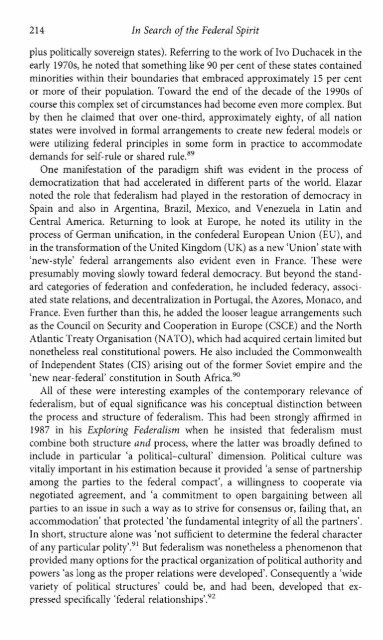IN SEARCH OF THE FEDERAL SPIRIT by MICHAEL BURGESS.
You also want an ePaper? Increase the reach of your titles
YUMPU automatically turns print PDFs into web optimized ePapers that Google loves.
214 In Search of the Federal Spirit<br />
plus politically sovereign states). Referring to the work of Ivo Duchacek in the<br />
early 1970s, he noted that something like 90 per cent of these states contained<br />
minorities within their boundaries that embraced approximately 15 per cent<br />
or more of their population. Toward the end of the decade of the 1990s of<br />
course this complex set of circumstances had become even more complex. But<br />
<strong>by</strong> then he claimed that over one-third, approximately eighty, of all nation<br />
states were involved in formal arrangements to create new federal models or<br />
were utilizing federal principles in some form in practice to accommodate<br />
demands for self-rule or shared rule. 89<br />
One manifestation of the paradigm shift was evident in the process of<br />
democratization that had accelerated in different parts of the world. Elazar<br />
noted the role that federalism had played in the restoration of democracy in<br />
Spain and also in Argentina, Brazil, Mexico, and Venezuela in Latin and<br />
Central America. Returning to look at Europe, he noted its utility in the<br />
process of German unification, in the confederal European Union (EU), and<br />
in the transformation of the United Kingdom (UK) as a new 'U nion' state with<br />
'new-style' federal arrangements also evident even in France. These were<br />
presumably moving slowly toward federal democracy. But beyond the standard<br />
categories of federation and confederation, he included federacy, associated<br />
state relations, and decentralization in Portugal, the Azores, Monaco, and<br />
France. Even further than this, he added the looser league arrangements such<br />
as the Council on Security and Cooperation in Europe (CSCE) and the North<br />
Atlantic Treaty Organisation (NATO), which had acquired certain limited but<br />
nonetheless real constitutional powers. He also included the Commonwealth<br />
of Independent States (CIS) arising out of the former Soviet empire and the<br />
'new near-federal' constitution in South Africa."<br />
All of these were interesting examples of the contemporary relevance of<br />
federalism, but of equal significance was his conceptual distinction between<br />
the process and structure of federalism. This had been strongly affirmed in<br />
1987 in his Exploring Federalism when he insisted that federalism must<br />
combine both structure and process, where the latter was broadly defined to<br />
include in particular 'a political-cultural' dimension. Political culture was<br />
vitally important in his estimation because it provided 'a sense of partnership<br />
among the parties to the federal compact', a willingness to cooperate via<br />
negotiated agreement, and 'a commitment to open bargaining between all<br />
parties to an issue in such a way as to strive for consensus or, failing that, an<br />
accommodation' that protected 'the fundamental integrity of all the partners'.<br />
In short, structure alone was 'not sufficient to determine the federal character<br />
of any particular polity'." But federalism was nonetheless a phenomenon that<br />
provided many options for the practical organization of political authority and<br />
powers 'as long as the proper relations were developed'. Consequently a 'wide<br />
variety of political structures' could be, and had been, developed that expressed<br />
specifically 'federal relationships'i'"


